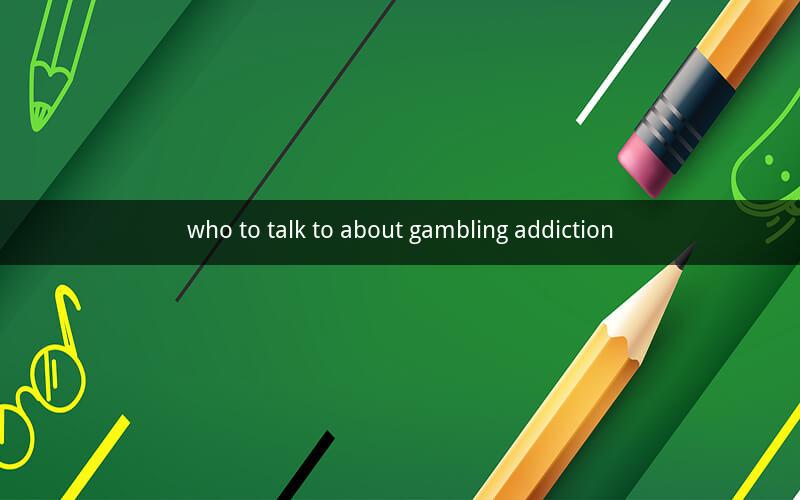
Contents
1. Understanding Gambling Addiction
2. The Importance of Seeking Help
3. Identifying the Right Person to Speak To
4. Professional Help: Therapists and Counselors
5. Support Groups and Communities
6. Family and Friends: A Supportive Network
7. Healthcare Professionals: Doctors and Nurses
8. Religious and Spiritual Leaders
9. Online Resources and Hotlines
10. Conclusion
1. Understanding Gambling Addiction
Gambling addiction, also known as problem gambling, is a serious condition that affects individuals from all walks of life. It involves an uncontrollable urge to gamble, despite negative consequences. This addiction can lead to financial, emotional, and social problems. Recognizing the signs and symptoms of gambling addiction is crucial for seeking appropriate help.
2. The Importance of Seeking Help
Seeking help is the first step towards overcoming gambling addiction. It is important to address the issue promptly to minimize the damage caused by excessive gambling. By seeking help, individuals can gain the necessary support and tools to overcome their addiction and rebuild their lives.
3. Identifying the Right Person to Speak To
When dealing with gambling addiction, it is essential to identify the right person to speak to. This may vary depending on the individual's specific circumstances. Here are some options:
4. Professional Help: Therapists and Counselors
Professional help, such as therapy and counseling, can be invaluable in treating gambling addiction. Therapists and counselors are trained to help individuals understand their addiction, develop coping strategies, and address underlying issues. They can offer personalized treatment plans tailored to the individual's needs.
4.1 Cognitive-Behavioral Therapy (CBT)
Cognitive-Behavioral Therapy (CBT) is a common treatment approach for gambling addiction. It focuses on identifying and changing negative thought patterns and behaviors that contribute to addictive gambling. CBT can help individuals develop healthier coping mechanisms and reduce the urge to gamble.
4.2 Dialectical Behavior Therapy (DBT)
Dialectical Behavior Therapy (DBT) is another therapeutic approach that can be effective for treating gambling addiction. It teaches individuals how to manage emotions, improve relationships, and develop distress tolerance skills. DBT can help individuals develop a more balanced perspective on gambling and their lives.
5. Support Groups and Communities
Support groups and communities can provide a sense of belonging and understanding for individuals struggling with gambling addiction. These groups often consist of individuals who have experienced similar challenges and can offer empathy, advice, and encouragement. Some well-known support groups include Gamblers Anonymous (GA) and the National Council on Problem Gambling (NCPG).
6. Family and Friends: A Supportive Network
Family and friends can play a crucial role in supporting individuals with gambling addiction. By offering love, understanding, and encouragement, they can help their loved ones through the recovery process. It is important for family and friends to educate themselves about gambling addiction and understand the importance of patience and support.
7. Healthcare Professionals: Doctors and Nurses
Healthcare professionals, such as doctors and nurses, can provide medical guidance and support for individuals with gambling addiction. They can assess the individual's physical and mental health, identify co-occurring conditions, and recommend appropriate treatment options.
8. Religious and Spiritual Leaders
Religious and spiritual leaders can offer moral and spiritual support for individuals struggling with gambling addiction. They can help individuals find meaning and purpose in their lives, providing a sense of community and connection.
9. Online Resources and Hotlines
Online resources and hotlines can provide immediate assistance for individuals in need. These resources can offer guidance, support, and information about treatment options. Some reputable online resources include:
- Gamblers Anonymous Online
- National Council on Problem Gambling Helpline: 1-800-522-4700
- Gam-Anon Helpline: 1-800-366-2446
10. Conclusion
Gambling addiction is a serious condition that requires comprehensive support and treatment. By seeking help from the right person or resource, individuals can overcome their addiction and rebuild their lives. It is important to recognize the signs of addiction, seek support, and take proactive steps towards recovery.
---
Questions and Answers
1. What are the signs of gambling addiction?
- Signs of gambling addiction include a preoccupation with gambling, loss of control over gambling behavior, lying to hide gambling, and neglecting responsibilities.
2. How can therapy help with gambling addiction?
- Therapy can help individuals understand their addiction, develop coping strategies, and address underlying issues. It can also provide a supportive environment for individuals to work through their challenges.
3. Are there any medications for gambling addiction?
- While there are no specific medications for gambling addiction, some individuals may benefit from medications to treat co-occurring conditions, such as depression or anxiety.
4. How can family and friends support a loved one with gambling addiction?
- Family and friends can support their loved ones by offering empathy, understanding, and patience. They can also educate themselves about gambling addiction and provide resources for help.
5. What role do support groups play in gambling addiction recovery?
- Support groups provide a sense of community, understanding, and support for individuals struggling with gambling addiction. They can offer empathy, advice, and encouragement.
6. Can gambling addiction lead to other mental health issues?
- Yes, gambling addiction can lead to other mental health issues, such as depression, anxiety, and substance abuse disorders.
7. How long does it take to recover from gambling addiction?
- Recovery from gambling addiction can vary from person to person. Some individuals may experience rapid improvement, while others may require ongoing support and treatment.
8. What are some coping strategies for gambling addiction?
- Coping strategies for gambling addiction include identifying triggers, developing healthier habits, and seeking support from loved ones and professionals.
9. Can gambling addiction be prevented?
- While gambling addiction cannot be completely prevented, individuals can reduce their risk by being aware of the signs, seeking help early, and avoiding risky gambling behaviors.
10. How can online resources and hotlines help with gambling addiction?
- Online resources and hotlines can provide immediate assistance, guidance, and support for individuals struggling with gambling addiction. They can offer information about treatment options and connect individuals with professionals and support groups.